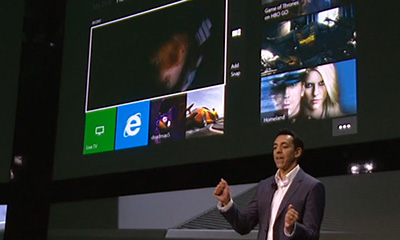Opinion: The Problem With Microsoft’s One Vision
Is anyone actually surprised?
Everyone knew well before Microsoft unveiled the Xbox One last night what direction the company was taking. It’s a direction that will, and has, given gamers the hump, but it does make business sense and I do understand why they would chase the market they are chasing.
Everything Microsoft showed last night relating to the core interface, the seamless switching between media and even the use of Kinect all seemed perfectly fine, even if it wasn’t what many wanted to hear.
When it came to anything relating to games however, last night proved to be a total mess, and for this reason their show will likely go down as one of the most botched game console reveals ever. I don’t believe there’s anything wrong with a games console being more than a games console, but I do firmly believe that the actual playing of games should be simple – not a hot steaming mess.
 Xbox One will require mandatory installs for all games, linked to one account but available to others on the same machine. To play that game on a friend’s console, however, you will need to be signed into your Xbox Live account on their device.
Xbox One will require mandatory installs for all games, linked to one account but available to others on the same machine. To play that game on a friend’s console, however, you will need to be signed into your Xbox Live account on their device.
Last night Phil Harrison told Eurogamer: “Think about how you use a disc that you own of an Xbox 360 game. If I buy the disc from a store, I use that disc in my machine, I can give that disc to my son and he can play it on his 360 in his room. We both can’t play at the same time, but the disc is the key to playing. I can go round to your house and give you that disc and you can play on that game as well.
“What we’re doing with the digital permissions that we have for Xbox One is no different to that.”
Except that this only confuses matters, adding a layer of bullshit that is anti-consumer and designed purely for profit. How so? Well it essentially kills the pre-owned market. Buying and playing a pre-owned game on the console will consist of two purchases. First the in-shop purchase and then when you attempt to play the game you’ll be ordered to pay a cost imposed by Microsoft that matches the price of that title set on their own store.
Microsoft’s event was aimed very specifically at a sport and Call of Duty-loving audience. It’s a big audience, and one that won’t be reading anything like this, be it on this site or even the BBC’s. They’re an easy group to make money from, even easier than the core gaming market left so disappointed last night. A success in our world requires innovation, a success in theirs requires more of the same.
It’s fair enough really, if someone is perfectly happy playing only FIFA and Call of Duty each year then more power to them. What doesn’t stick right is how blatantly Microsoft are taking these people for a ride. How will that audience react to required installations and having to pay an additional charge to play pre-owned games? Things like this will factor not into the initial success of the machine, but certainly into the year that follows.

Microsoft are intent on making ‘Xbox’ more than just a gaming brand, and their bold vision should be commended on that front, but it’s important to realise that the word Xbox is now synonymous with the world of gaming. To the majority of the public that’s all it is and ever will be – “What’s an Xbox?” “It’s a games machine”. That won’t go away, and yet Microsoft seem to want it to.
As I said earlier there’s nothing wrong with a games console that lets you watch Netflix or stream Sky (something that’s saved my family a few scraps for the TV remote). On the 360 it’s all added value, but only value added to a core and simple thing that the box did – play games.
All the talk of TV, sports, TV, TV, sports and sports could have been shrugged off, or would have caused less of an uproar last night, if the actual playing of the games we cry out for, and will see at E3 next month, were simple to play and enjoy.
Everyone who buys an Xbox One later this year will be buying it as a games console, and yet that’s the part of the machine Microsoft seem intent to complicate and exploit for their own gain. The beginning of a console cycle is when you need the core gamers most, their support is a strong foundation onto which further success is found.
But will a foundation of casual gamers support the weight of Microsoft’s ambition?





